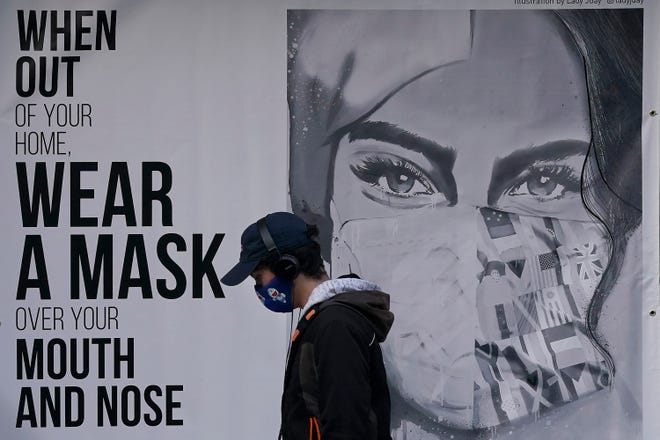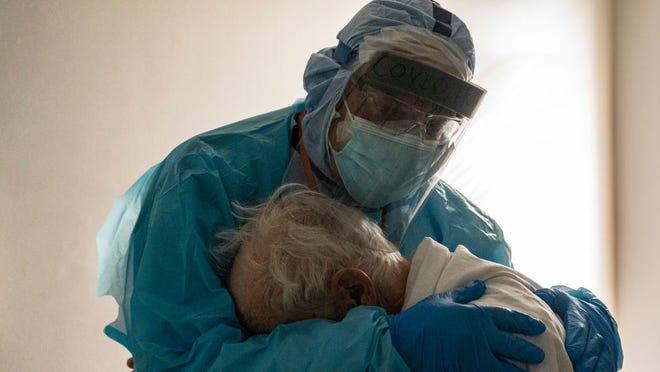COVID-19 public health message is bigger than messenger, experts say
California Gov. Gavin Newsom’s trip to a posh restaurant in November to celebrate a friend’s birthday prompted swift backlash – and even Newsom himself said he could have modeled better behavior.
His ill-conceived dinner came after pleas to locals to avoid social gatherings to stop the spread of COVID-19 over the holidays. It was just one instance of a politician who endorsed coronavirus-related restrictions engaging in behavior they told their constituents to avoid.
Politicians are human messengers, experts told USA TODAY. They can – and sometimes do – fail to model the proper behavior to slow the spread of the coronavirus. That doesn’t mean people should give up on mitigation measures recommended by public health officials like wearing masks, social distancing and washing their hands.
Still, the actions of politicians can do “extraordinary damage,” said Dr. Georges Benjamin, executive director for the American Public Health Association.
“You lose the authority to be able to get people to do what you ask,” Benjamin told USA TODAY. “It also undermines people’s belief that what you’re saying is real, so people don’t follow your advice because they don’t think you’re serious about it.”
Role-playing, planning for earthquakes, mass training:How US health care centers readied for arrival of COVID-19 vaccine
What Americans should do is follow the advice of public health officials, experts said — even if politicians fail to do the same. The coronavirus is raging through the United States, with more than 16.2 million confirmed cases Sunday night and record-breaking daily death totals.
“We actually have, in this country, standardized emergency protocols for different versions of crisis,” Deborah Glik, professor at UCLA Fielding School of Public Health, said. “Fire, you look to the fire service. Terrorism, you look to the FBI or the police. In a pandemic, the leadership falls on the health sector.”
Trust public health leaders to model appropriate behavior
Newsom isn’t the only politician who ducked his own coronavirus restrictions.
Denver Mayor Michael Hancock apologized for flying to visit family members in Mississippi even as he tweeted out advice to residents asking them to avoid traveling over Thanksgiving.
In early November, as health officials warned of an impending COVID-19 spike, Steve Adler, the mayor of Austin, Texas, hosted an outdoor wedding and reception with 20 guests for his daughter at a trendy hotel near downtown.
He followed that with a vacation to Cabo San Lucas, Mexico.

Your COVID-19 questions, answered:What are the side effects? What are the Pfizer vaccine ‘ingredients?’
“Research would confirm again and again, when people feel that what’s asked from them is not actually followed by those in power, there’s a sense of betrayal that will occur,” said Dominique Brossard, professor and chair of the Department of Life Sciences Communication at the University of Wisconsin-Madison.
She added, “That betrayal can destroy trust. As soon as trust is destroyed, potential of future of recommendation and regulations … will tend not to be followed, as well.”
The public wouldn’t be wrong to stop taking such politicians seriously, said Karl Minges, chair of the Department of Health Administration & Policy at the School of Health Sciences at University of New Haven. But frustrated citizens should instead turn to local health leaders — not political critics looking to capitalize on an opponent’s faux pas.
Some Americans may be required to get a COVID-19 vaccine. But not by the federal government.
Local health leaders understand the uniquely local nature of COVID-19 in their community and are often on the frontlines of fighting the virus — so they tend to be more diligent about following health guidance, Minges said. And, often, they’re the ones informing the politicians behind the scenes.
The protocols set by officials have chaffed – pandemic fatigue has set in nationwide.
“That’s part of the problem we have,” Glik said. “When you set out abstinence-only rules, it’s easier to break them.”
She said setting public health rules, then not abiding by them is a “smaller sin” than not having any coherent messaging or plan. It’s a statement Minges echoed, saying politicians who set a bad example are better than those who set no example.
“At least you’re providing that guidance to begin with,” Minges said, even if it eventually is undermined.
Politicians in COVID-19: ‘We shouldn’t look to them as examples’
So, what is the role of the politician in a pandemic? They should be messengers of critical information – such as mask wearing and social distancing, in the case of COVID-19, Minges said.
Changing people’s behavior is hard and health officials have limited means of communicating their message, Minges said. Ad campaigns, statements from high-profile figures such as Dr. Anthony Fauci and the public support of politicians are among the most effective methods.
Elected officials will make mistakes, Brossard said. Recognizing and owning those mistakes is critical to rebuilding trust.
Coronavirus spreads among elected leaders:Republicans are hit the hardest
“We shouldn’t look to them as examples,” she said. “But, they should give us the example, do you see the difference? … They need to realize they represent the people.”
UCLA’s Glik said people aren’t used to having public health departments play such prominent roles in their lives. While the pandemic continues in the U.S., even with vaccines on the way, public health officials will continue to set the tone.
“I think people don’t realize that,” Glik said. “We haven’t really seen this level of disaster. Typically, it’s foodborne outbreak or a measles outbreak and they’re smaller, they’re more contained, they’re more regional. At that point, yes, the health department steps in and does its thing, but people aren’t freaked out by it.”
Contributing: Winston Gieseke, The Desert Sun (Palm Springs, Calif.); Tony Plohetski, Austin American-Statesman.
JEC: All of Joel’s notes are here. Wanted to make sure we didn’t lose anything.

